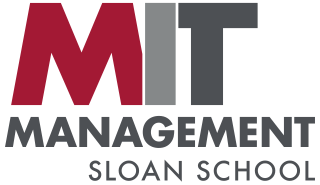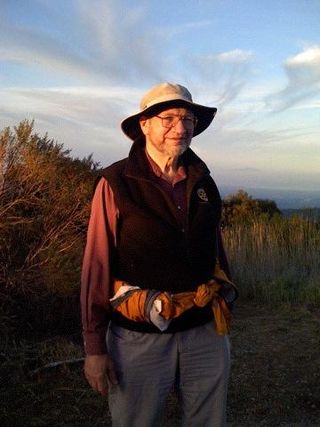
Lean manufacturing is a production method aimed primarily at reducing times within the production system as well as response times from suppliers and to customers. It is closely related to another concept called just-in-time manufacturing. Just-in-time manufacturing tries to match production to demand by only supplying goods which have been ordered and focuses on efficiency, productivity, and reduction of "wastes" for the producer and supplier of goods. Lean manufacturing adopts the just-in-time approach and additionally focuses on reducing cycle, flow, and throughput times by further eliminating activities which do not add any value for the customer. Lean manufacturing also involves people who work outside of the manufacturing process, such as in marketing and customer service.

The Sloan School of Management at Massachusetts Institute of Technology is the business school of the Massachusetts Institute of Technology, a private university in Cambridge, Massachusetts. MIT Sloan offers bachelor's, master's, and doctoral degree programs, as well as executive education. Its degree programs are among the most selective in the world. MIT Sloan emphasizes innovation in practice and research. Many influential ideas in management and finance originated at the school, including the Black–Scholes model, the Solow–Swan model, the random walk hypothesis, the binomial options pricing model, and the field of system dynamics. The faculty has included numerous Nobel laureates in economics and John Bates Clark Medal winners.

Cox Enterprises, Inc. is a privately held global conglomerate headquartered in Atlanta, Georgia, United States, with approximately 55,000 employees and $21 billion in total revenue. Its major operating subsidiaries are Cox Communications and Cox Automotive. The company's major national brands include AutoTrader, Kelley Blue Book, Manheim Auctions and more.

Charles Eric Leiserson is a computer scientist, specializing in the theory of parallel computing and distributed computing, and particularly practical applications thereof. As part of this effort, he developed the Cilk multithreaded language. He invented the fat-tree interconnection network, a hardware-universal interconnection network used in many supercomputers, including the Connection Machine CM5, for which he was network architect. He helped pioneer the development of VLSI theory, including the retiming method of digital optimization with James B. Saxe and systolic arrays with H. T. Kung. He conceived of the notion of cache-oblivious algorithms, which are algorithms that have no tuning parameters for cache size or cache-line length, but nevertheless use cache near-optimally. He developed the Cilk language for multithreaded programming, which uses a provably good work-stealing algorithm for scheduling. Leiserson coauthored the standard algorithms textbook Introduction to Algorithms together with Thomas H. Cormen, Ronald L. Rivest, and Clifford Stein.

Dennis Lynn Meadows is an American scientist and Emeritus Professor of Systems Management, and former director of the Institute for Policy and Social Science Research at the University of New Hampshire. He is President of the Laboratory for Interactive Learning and widely known as a coauthor of The Limits to Growth.

Craft production is manufacturing by hand, with or without the aid of tools. The term "craft production" describes manufacturing techniques that are used in handicraft trades. These were the common methods of manufacture in the pre-industrialized world.

Mitchel Resnick is LEGO Papert Professor of Learning Research, Director of the Okawa Center, and Director of the Lifelong Kindergarten group at the Massachusetts Institute of Technology (MIT) Media Lab. As of 2019, Resnick serves as head of the Media Arts and Sciences academic program, which grants master's degrees and Ph.D.s at the MIT Media Lab.

Bertram Raphael is an American computer scientist known for his contributions to artificial intelligence.

Alex Paul "Sandy" Pentland is an American computer scientist, the Toshiba Professor of Media Arts and Sciences at MIT, and serial entrepreneur.
The Machine That Changed the World is a 1990 book about automobile production, written by James P. Womack, Daniel T. Jones, and Daniel Roos.
Lean dynamics is a business management practice that emphasizes the same primary outcome as lean manufacturing or lean production of eliminating wasteful expenditure of resources. However, it is distinguished by its different focus of creating a structure for accommodating the dynamic business conditions that cause these wastes to accumulate in the first place.
Lean IT is the extension of lean manufacturing and lean services principles to the development and management of information technology (IT) products and services. Its central concern, applied in the context of IT, is the elimination of waste, where waste is work that adds no value to a product or service.
The Program on Vehicle and Mobility Innovation (PVMI) is the oldest and largest international research consortium aimed at analyzing the global automotive industry.
Lean enterprise is a practice focused on value creation for the end customer with minimal waste and processes. The term has historically been associated with lean manufacturing and Six Sigma due to lean principles being popularized by Toyota in the automobile manufacturing industry and subsequently the electronics and internet software industries.

William John Mitchell was an Australian-born author, educator, architect and urban designer, best known for leading the integration of architectural and related design arts practice with computing and other technologies.
Design for lean manufacturing is a process for applying lean concepts to the design phase of a system, such as a complex product or process. The term describes methods of design in lean manufacturing companies as part of the study of Japanese industry by the Massachusetts Institute of Technology. At the time of the study, the Japanese automakers were outperforming the American counterparts in speed, resources used in design, and design quality. Conventional mass-production design focuses primarily on product functions and manufacturing costs; however, design for lean manufacturing systematically widens the design equation to include all factors that will determine a product's success across its entire value stream and life-cycle. One goal is to reduce waste and maximize value, and other goals include improving the quality of the design and the reducing the time to achieve the final solution. The method has been used in architecture, healthcare, product development, processes design, information technology systems, and even to create lean business models. It relies on the definition and optimization of values coupled with the prevention of wastes before they enter the system. Design for lean manufacturing is system design.
From 1978 to 2021 the MIT Enterprise Forum (MITEF) operated chapters in major cities in the U.S. and worldwide. The MIT Enterprise Forum was non-profit organization affiliated with the Massachusetts Institute of Technology (MIT) through MIT Technology Review. The chapters ran a range of events and programs targeted to help early-stage entrepreneurs, promote innovative technology to the general public. In the spring of 2021, MIT Technology Review, the parent and MIT Enterprise Forum, Inc (“Global”) notified the Chapters that MIT Technology Review decided to no longer support the Chapters of the MIT Enterprise Forum. In July 2021, the largest and flagship chapter of the MIT Enterprise Forum; the MIT Enterprise Forum of Cambridge subsequently renamed itself The eForum in order to continue its mission of helping early stage entrepreneurs succeed.

John F. Krafcik was the CEO of Waymo from 2015 to 2021. Krafcik was the former president of TrueCar and president and CEO of Hyundai Motor America. He was named CEO of Google's self-driving car project in September 2015. Krafcik remained CEO after Google separated its self-driving car project and transitioned it into a new company called Waymo, housed under Google's parent company Alphabet Inc.

Munther A. Dahleh is the William Coolidge Professor of electrical engineering and computer science and director of the Massachusetts Institute of Technology (MIT) Institute for Data, Systems, and Society (IDSS).
Daniel T. Jones is an English author and researcher. He won the Shingo Prize for Operational Excellence in the Research and Professional Publication category multiple times for his books The Machine that Changed the World, Lean Thinking: Banish Waste and Create Wealth in Your Organization and Seeing the Whole: Mapping the Extended Value Stream.











